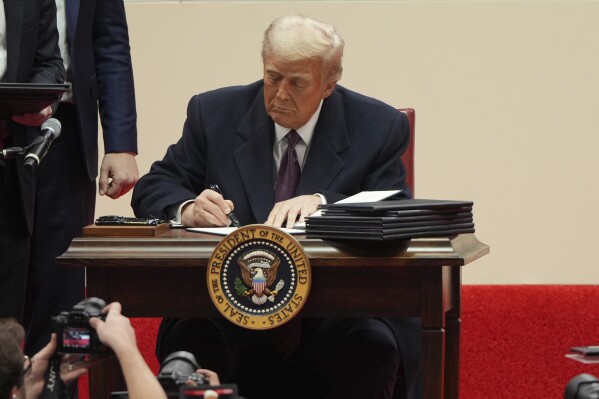On January 20, 2025, Donald Trump was sworn in for his second term as President of the United States. He promptly issued executive orders that drastically shifted the nation’s climate policy. Among the first actions was the announcement of the U.S. withdrawal from the Paris Agreement, making it the only nation out of 193 signatories to leave the global accord.
The withdrawal, set to take a year to formalise, has sparked strong reactions globally. Laurence Tubiana, CEO of the European Climate Foundation and a key architect of the Paris Agreement, called the decision “unfortunate” but highlighted the resilience of multilateral climate action. “Europe and other partners must now lead the way,” Tubiana remarked, urging nations to demonstrate how ambitious climate action can protect people, strengthen economies, and build resilience.
Domestically, states and cities remain committed to climate goals. The U.S. Climate Alliance, representing 24 states and 55% of the U.S. population, reaffirmed its dedication to the Paris Agreement. “Our states and territories continue to have broad authority under the U.S. Constitution to protect our progress,” noted New York Governor Kathy Hochul and New Mexico Governor Michelle Lujan Grisham in a letter to the UNFCCC.
In addition to the Paris exit, President Trump declared an “Energy Emergency,” enabling expanded fossil fuel production while scaling back renewable energy initiatives. Policies include halting wind energy leases and reviewing electric vehicle incentives, measures critics say undermine years of progress in transitioning to a sustainable energy future.
Dr. Jonathan Pershing is a veteran diplomat who has worked under four US presidents and attended every UN COP climate summit.
“The climate crisis is a global issue that demands urgent action. Failure to act will lead to more wildfires, droughts, and harm to communities and businesses in the United States and worldwide. While the President is withdrawing the U.S. from the Paris Agreement, the reality is that the federal government alone was never going to solve the climate crisis.
Laurence Tubiana, CEO of the European Climate Foundation and a key architect of the Paris Agreement
“The US withdrawing from the Paris Agreement is unfortunate, but multilateral climate action has proven resilient and is stronger than any single country’s politics and policies.
Europe – alongside other partners – now has the responsibility and opportunity to step up and lead. By pushing forward with a fair and balanced transition, it can show that ambitious climate action protects people, strengthens economies, and builds resilience.
The climate crisis cannot be tackled by any country alone – it demands a multilateral response. But this moment should serve as a wake-up call to reform the system, ensuring that those most affected – communities and individuals on the frontlines – are at the centre of our collective governance.”

New York Governor Kathy Hochul and New Mexico Governor Michelle Lujan Grisham, co-chairs of the U.S. Climate Alliance, submitted to UNFCCC’s Simon Stiell
“We write as co-chairs of the United States Climate Alliance, a bipartisan coalition of two dozen governors representing nearly 60 percent of the U.S. economy and 55 percent of the U.S. population, to make it clear to you, and the rest of the world, that we will continue America’s work to achieve the goals of the Paris Agreement and slash climate pollution,”
“Our states and territories continue to have broad authority under the U.S. Constitution to protect our progress and advance the climate solutions we need. This does not change with a shift in federal administration.”
Daniel Musa Gwary – Centre For Arid Zone Studies, University of Maiduguri,
“Trump’s executive order to withdraw the US from the Paris climate change pact is an unfortunate development. This action will set back the much-needed global climate action. Poor and climate-most vulnerable countries will continue to be at the receiving end of climate change impacts. It will be uncertain how the remaining developing and richer countries (Annex 1 countries) will raise the promised adaptation funds for the poor Annex 2 countries.
The world will be watching to see which country or block will now take over the global lead for climate change flight to limit global warming to below 1.5c.”
Dr David Micheal Terungwa – Global Initiative for Food Security and Ecosystem Preservation
“This move was entirely expected. Trump took similar action during his first term, reiterating this intention during his campaign. We anticipated it. When the U.S. withdrew from the Paris Agreement under his first administration, Europe stepped up to fill the gap to some extent, and I believe the same will happen this time.
Yes, it’s significant that the world’s largest economy and a major emitter of greenhouse gases is exiting the Agreement. However, this is as much about politics and business as it is about climate.
That said, many of the biggest funders of global climate initiatives are Americans, demonstrating that climate action in the U.S. is not solely tied to Trump’s policies. There are influential individuals, even within the Democratic Party, who understand the urgency of addressing climate change. Our focus should be on collaborating with these allies and pushing for progress through Congress.
Most importantly, this withdrawal will not halt the fight against climate change. The commitment to action remains strong globally, and we must keep the momentum going.”
This new direction comes at a time when the Biden administration’s climate policies, such as the Inflation Reduction Act, had spurred the creation of over 775,000 manufacturing jobs, many in Republican-led districts. Trump’s orders also dismantled key programmes, including the recently established American Climate Corps, and called for reviews of major energy infrastructure projects.
As the Trump administration moves swiftly to reshape climate policy, the global community and domestic stakeholders are left to navigate an uncertain future, balancing the need for progress with the reality of federal resistance.


